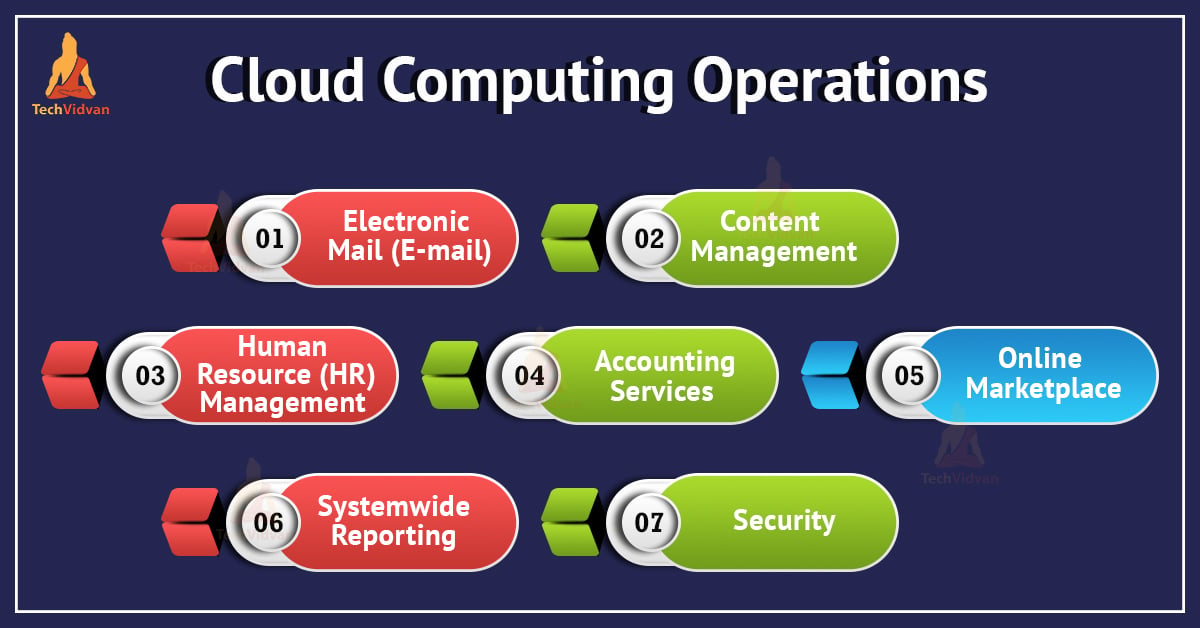As we know, Cloud Computing is gaining popularity among many organizations. So today, we will talk about one more topic of Cloud Computing. It is known as Cloud Computing Operations. It is considered one of the key concepts in Cloud Computing.
What are Cloud Computing Operations?
Cloud Operations is the process of operating and running the cloud infrastructure and the environment. It is augmented by the management to ensure that all the tasks, processes, and resources are managed accurately and adequately to run the cloud operations smoothly.
The critical focus of Cloud Operations is to ensure that the operations are running fluently and meeting the service requirements. The important motto is the client’s satisfaction with the help of hardware and software and the networking infrastructure. It will offer an efficient cloud environment.
Objectives of Cloud Computing Operations
The objectives of Cloud Computing Operations are as follows:
- To deliver cloud services or infrastructure, or they can offer cloud services and infrastructure together.
- Cloud Operations helps to develop performance and capacity. Also, it makes sure that there is proper management of resources regardless of the used platform or the infrastructure location.
- It helps to meet the service level agreements (SLA)
- Cloud Operations also maintains the compliance and configurations.
- It can automate the set of services, switch the management and charge back.
- It also helps in maintaining transparency and provides genuine metering.
- Cloud Operations also ensure disaster recovery planning and mitigation.
Cloud Operations Management
- The security practices should be done at the right moment, and the customer should be billed accordingly.
- Organizations should use an appropriate set of tools for managing the cloud and the resources to perform functions in the cloud.
- In Cloud Operation Management, make sure the selection of resources should be appropriate.
- With an appropriate set of tools and resources, there will not be any wastage of efforts and redundancy.
- The service quality should be decent because it will save cost and effort.
- There must be a standardized process for task repetition, and an automation process should be followed.
- The client and service provider both are equally responsible for managing the cloud operations management as the cloud management involves each step of the daily process in the cloud environment or platform.
- There are multiple practices to safeguard and manage cloud operations, but the regular exercise is always the same.
- Cloud Operation also consists of analytics which is used by the users to develop the cloud environment visibility. Thus, it helps to run the services safely and minimize the cost expenditure.
Advantages of Cloud Computing Operations
- By using Cloud Computing Operations, the technical management process is eased, and the compound and overpriced hardware usage is erased.
- Cloud Computing lowers down the risk of disruption while increasing efficiency.
- It is user-friendly and flexible as it offers high speed and quality to the user according to the requirements.
- Cloud Computing Operations minimizes the expenditure by offering appropriate maintenance to the infrastructure and providing additional benefits to the clients.
- It will also erase the delivery cost of cloud services, and as a result, it helps save capital expenditure.
- Multiple tools can optimize the utilization capacity and manage the horizontal and vertical scaling of an application.
- Cloud Computing Operations is also scalable enough to increase the computing power depending on the client’s requirement so that it is economical and beneficial for the customer.
- Cloud Computing Operations are more manageable than traditional practices.
- It requires less resources than traditional practices.
- Multiple steps in Cloud Operations can be automated.
- It can scale out and automatically scale in the servers.
- A cloud can extract infrastructure from an application.
Challenges in Cloud Computing Operations
- In Cloud Operations, it is possible to overspend the capital on extra servers
- The governance ability is reserved
- Security factors in Public Cloud can be risky
Why Do Cloud Operations Matters?
Migration of applications on cloud environments has its own advantages, like the free trial on infrastructure. But remember, applications transferred on the cloud must be well managed, and maintaining the cloud applications is similar to working them on-premises.
The CloudOps team takes responsibility for performing this operation, monitoring and automating the tools for the workloads that run on the cloud.
Four Pillars of Cloud Operations
The first Pillar indicates extraction and decouples the management from the available infrastructure so the cloud machine instances, storage instances, security, networking, and governance can be managed with a single control.
The practice of management authorizes the administrator to make use of a single tool.
The second Pillar is described as provisioning. Basically, an organization will take up the charge to manage the machine-allocated instances on the cloud in any one of the methods. They can choose to move with self-provisioning or move with automated provisioning.
By using self-provisioning, the administrator permits the cloud users to allocate their own machines, track their usage, and maintain a record.
While automated provisioning is more convenient than user convenience because it permits applications themselves to request additional resources as per the requirement and automatically de-provision them when the task is completed.
The third Pillar stands for Policy Driven. It requires developing and enforcing the policies that limit the users and cloud applications in the public cloud.
This is performed to ensure that an application does not end up using the cloud resources when there is no revenue generated.
The final Pillar stands for automation. Basically, the automated process includes the following factors.
Provisioning
- User Management
- Security Management
- API Management
- In automation, Artificial intelligence and Machine Learning play crucial roles in automating the tasks or workloads.
CloudOps and DevOps
DevOps is a joint approach that searches to mic the workloads traditionally performed either by the organization’s application development or the IT Operations team.
The fundamental goal of DevOps is to establish and enhance the communication between two groups and create development pipelines that permit continuous integrations.
Alternatively, CloudOps focuses on high availability (HA) and continuous operations performed in Public Cloud.
CloudOps Engineers as a Career Path
If you aim to become a CloudOps engineer, you must have a bachelor’s degree in Computer Science, Engineering, or related to the discipline.
Many organizations also expect the candidate to have robust cloud platforms like AWS, GCP, and AZURE.
Every day CloudOps engineers will be assigned tasks to create processes for measuring the system’s effectiveness and identifying the areas of development.
Cloud Computing Operations
Cloud Computing can perform some operations. They are as follows:
- Electronic Mail (E-mail)
- Content Management
- Human Resource (HR) management
- Accounting Services
- Online Marketplace
- Systemwide Reporting
- Security
Cloud Operations Management
There are multiple methods to manage regular cloud operations. They are as follows:
- Make sure the user always allocates the right working tools and resources to perform any function in the cloud.
- The things should be done at the right moment and with proper costing.
- The selection of a reasonable and appropriate resource is essential for operation management.
- The process should follow a standard format and be automated to manage the regular and repetitive tasks.
- Using a reliable process will reduce the efforts and redundancy.
- The user should maintain the service quality to avoid rework in the future.
Changes in the Roles of Cloud Operation
Many organizations invest their capital in information and communication technology, resulting in only less of their total funds being used in the development process. The key reason behind this is the skill-less operation and automation handling.
In Cloud Computing Operations, the administrator of an organization is the person responsible for building and operating the infrastructure.
Thus, it eliminates the role of an infrastructure operation manager. The responsibility of the infrastructure operation manager is to transfer to the operation manager and operations administrator.
Conclusion
Thus, it is considered as Cloud Operations are one of the crucial aspects for better cloud functionality. Cloud Operations also helps to develop operation stability along with the increased efficiency.

